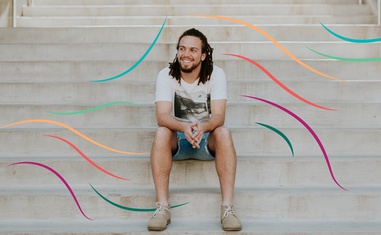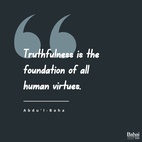The views expressed in our content reflect individual perspectives and do not represent the official views of the Baha'i Faith.
All of the world’s great Faiths request one basic thing of us – that we do our best to follow the lived example of the prophets and founders of those belief systems.
Christ loved his enemies, so Christians should, too. Buddha detached himself from material pursuits, so Buddhists should, too. Baha’u’llah, the prophet and founder of the Baha’i Faith, loved all humanity and did not resort to violence even in the face of grave injustice – so Baha’is should follow that example.
Of course, this is one of the hardest parts of religion.
We’re no prophets, but we’re asked to do our best to emulate the lives of the prophets. The founders of every Faith call on us to raise our spiritual standards. Their loving, kind, peaceful examples challenge us to do better each day. Their actions in the world demonstrate ways we can overcome our prejudices and hatreds, transcend our tendencies toward revenge and retribution, and move past our angry, violent impulses in pursuit of the realization that we are all one people with one loving Creator. Abdu’l-Baha put it this way:
… ye must show forth tenderness and love to every human being, even to your enemies, and welcome them all with unalloyed friendship, good cheer, and loving-kindness. When ye meet with cruelty and persecution at another’s hands, keep faith with him; when malevolence is directed your way, respond with a friendly heart. To the spears and arrows rained upon you, expose your breasts for a target mirror-bright; and in return for curses, taunts and wounding words, show forth abounding love. – Selections from the Writings of Abdu’l-Baha.
Can you imagine anything harder to do?
In a talk he gave in Oakland, California in 1912, Abdu’l-Baha elaborated on this challenging Baha’i principle even further:
Among the teachings of Baha’u’llah is one requiring man, under all conditions and circumstances, to be forgiving, to love his enemy and to consider an ill-wisher as a well-wisher. Not that he should consider one as being an enemy and then put up with him, or to simply endure him, or to consider one as inimical and be forbearing toward him. This is declared to be hypocrisy. This love is not real. Nay, rather, you must see your enemies as friends, ill-wishers as well-wishers and treat them accordingly. That is to say, your love and kindness must be real. Your well-wishing must be reality, not merely forbearance, for forbearance, if not of the heart, is hypocrisy. – Star of the West, Volume 3, p. 191.
Doesn’t this seem like the exact opposite of our current call-out and cancel culture? Rather than returning hatred for hatred, or disdain and dismissal when racism rears its ugly head, or anger and alienation in response to injustice, the Baha’i teachings ask us to respond with friendship and loving-kindness when we encounter cruelty, persecution and malevolence.
But how can anyone possibly meet that standard? How could we encounter someone who hated us and immediately love them in return?
Baha’u’llah, in his book Epistle to the Son of the Wolf, wrote that this kind of loving response requires an entirely new mindset and soul-set, a fully-internalized view of the world that truly sees all people as one. In that sense, we can only have empathy for our enemies when we have no enemies – when every person sees only friends and relatives, exerting themselves to return love for hatred:
Ye are the fruits of one tree, and the leaves of one branch. Deal ye one with another with the utmost love and harmony, with friendliness and fellowship. He Who is the Daystar of Truth beareth Me witness! So powerful is the light of unity that it can illuminate the whole earth. …
Exert yourselves that ye may attain this transcendent and most sublime station, the station that can insure the protection and security of all mankind. This goal excelleth every other goal, and this aspiration is the monarch of all aspirations.
If all of us come from the same family – the human family – then from one perspective we have no real adversaries or enemies. We only have brothers and sisters. Sure, healthy families sometimes quarrel and don’t get along temporarily, but the love they have for one another ultimately unifies them:
Be ye loving fathers to the orphan, and a refuge to the helpless, and a treasury for the poor, and a cure for the ailing. Be ye the helpers of every victim of oppression, the patrons of the disadvantaged. Think ye at all times of rendering some service to every member of the human race. Pay ye no heed to aversion and rejection, to disdain, hostility, injustice: act ye in the opposite way. Be ye sincerely kind, not in appearance only. – Abdu’l-Baha, Selections from the Writings of Abdu’l-Baha.
If we hope to establish love and unity in the world, the Baha’i teachings say, we first have to establish it in ourselves. When we treat others as our enemies, we only confirm and validate their hatred. When we treat others as our enemies, we simply continue the cycle of hatred, passing it from one heart to another. When we treat others as our enemies, we fan the flames rather than extinguishing them. But when we treat others as friends and family members, we automatically invite them to do the same.
So be courageous the next time you encounter animosity. Be the first person to refuse to continue the cycle. Respond with love.
Try it – you’ll be amazed at the results. Those who have hatred in their hearts expect to encounter the same feelings in the hearts of others, and when they don’t, they suddenly see that a different course of action is possible. Rather than creating victimhood, returning love for hatred creates strength and resilience. When you refuse to be a victim of another person’s animosity or prejudice, you reject the constricting role of victimhood and start the creative process of building love and unity.
No one would characterize this loving reaction to hatred as simple or easy – in fact, it may be the toughest adjustment you’ve ever had to make – but the courage to do it will inevitably lead you and those around you to a more joyful and radiant life.

















Comments
Sign in or create an account
Continue with Facebookor